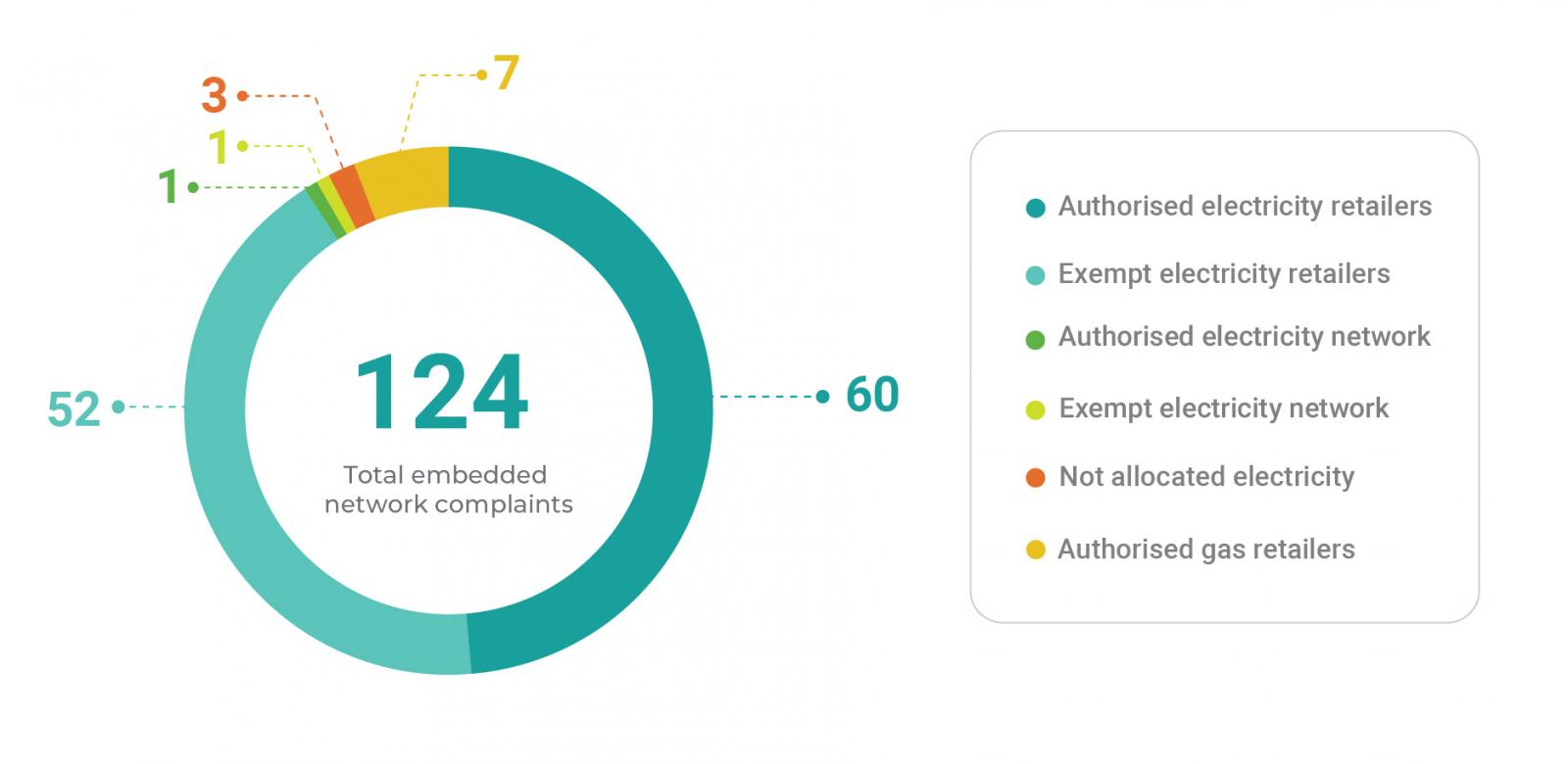-
Home
-
Publications and submissions
-
Reports
-
EWON Insights
-
EWON Insights Apr-Jun 2023
- Embedded network complaints and case studies
Embedded network complaints and case studies

This quarter EWON opened 124 complaints from embedded network customers.
Table 7 – Embedded network customer complaints by service provider, April to June 2023
|
Service provider |
Complaints by embedded network customers |
|---|---|
|
Electricity > network > authorised |
1 |
|
Electricity > network > exempt |
1 |
|
Electricity > not allocated |
3 |
|
Electricity > retail > authorised |
60 |
|
Electricity > retail > exempt |
52 |
|
Gas > retail > authorised |
7 |
|
Total |
124 |
EWON closed 130 complaints from customers whose electricity or gas (including hot water) is supplied through an embedded network.
Table 8 – Top 10 core issues for embedded network complaints closed April to June 2023
|
Core complaint issues |
Complaints |
|---|---|
|
Billing > high > disputed |
39 |
|
Billing > contract terms > price increases |
8 |
|
Billing > tariff > rate |
7 |
|
Billing > backbill |
6 |
|
Credit > payment difficulties > current / arrears |
6 |
|
Credit > disconnection / restriction > impending |
5 |
|
Billing > rebate / concession > error |
4 |
|
General > energy / water |
4 |
|
Billing > account closing > error |
3 |
|
Billing > account opening > error |
3 |
Table 9 – Top 10 issues for embedded network complaints closed April to June 2023
|
All complaint issues |
Complaints |
|---|---|
|
Billing > high > disputed |
50 |
|
Customer service > poor service |
25 |
|
Billing > tariff > rate |
10 |
|
Billing > backbill |
9 |
|
Billing > contract terms > price increases |
9 |
|
Credit > payment difficulties > current / arrears |
9 |
|
Billing > account closing > error |
7 |
|
Credit > disconnection / restriction > impending |
7 |
|
Customer service > failure to consult / inform |
6 |
|
Customer service > failure to respond |
6 |
Customers that live in embedded networks still don’t receive the same protections as customers connected directly to the electricity network. The complaints that we receive highlight the complexity of issues customers living in embedded networks deal with and the additional stress this causes.
In addition to the gap in consumer protections, customers in embedded networks have also been impacted by rising energy prices. However, they do not have practical access to retail competition and can't easily switch to a better offer from another energy retailer to reduce their bills. Customers have no option but to pay the price increases set by their current retailer or exempt seller.
EWON has welcomed the NSW Government’s NSW Embedded Network Action Plan and Draft Ministerial Statement of Expectations and provided feedback during its consultation. The Plan works towards bridging the gap in consumer protections for customers living in embedded networks, with other energy residential and small business customers. We look forward to participating in future consultations with stakeholders.
The complaints below highlight some of the complex issues that residents living in embedded networks deal with.
 Misaligned hot water meter causes high bills
Misaligned hot water meter causes high bills
A customer living in an apartment block part of a gas embedded network received a gas bill for 7 November 2022 to 8 February 2023 for $480, based on an actual meter reading. He thought the bill was too high and didn’t reflect his usage but thought the previous four bills were correct and based on actual meter readings.
When the customer looked at the meter reading on the disputed bill, it showed a reading that was substantially different to the actual meter. He took a photo of the meter and contacted his electricity retailer which said it would send an amended bill by 15 March 2023, however he didn’t receive this.
The customer then received an amended bill that was higher than the original disputed bill and an overdue notice.
EWON advised the customer that as he lived in an embedded network and was billed in litres for the hot water, our review would focus on whether he was billed appropriately for what was recorded on the meter.
EWON contacted the retailer to obtain more information and it said it had sent information to the meter data provider as it appeared that the meter was not aligned with the meter data logger. The meter data provider hadn’t been able to access the meter remotely and needed to attend the property to test the meter and align the meter data logger, and had contacted the building manager to arrange access to the meter on 1 May 2023.
EWON’s review of the previous bills indicated the customer hadn’t been billed for any hot water from when he moved into the property in August 2021 to February 2022, and very little hot water for the period February 2022 to August 2022. After the meter had been realigned, the retailer then issued an amended bill for the period 7 November 2022 to 1 May 2023 for $630, with a balance owing of $150.
 During our investigation, the customer provided photos of the meter in March 2023 and May 2023, which were in line with the daily average consumption on the customers amended bill. The customer was satisfied that the billing was appropriate, and the retailer applied $100 to his account to acknowledge the poor customer service that he had experienced.
During our investigation, the customer provided photos of the meter in March 2023 and May 2023, which were in line with the daily average consumption on the customers amended bill. The customer was satisfied that the billing was appropriate, and the retailer applied $100 to his account to acknowledge the poor customer service that he had experienced.
 Lack of meter data leads to hot water back bill
Lack of meter data leads to hot water back bill
A customer received a high gas bill for 28 June 2021 to 30 September 2022 for $920. He contacted his electricity retailer to dispute the bill, confirm the meter readings and request an explanation for the delay in receiving a bill.
The retailer couldn’t provide an explanation for the delay in issuing a bill but said it would review the bill and get back to him. He was not contacted by the retailer, however he received two amended bills for the period 28 June 2021 to 21 January 2023 for $1,800 and another for the period 1 May 2022 to 28 February 2023 for $390.
EWON initially referred the complaint to a specialist team at the retailer for resolution, however the customer returned as it didn’t contact him, and he received a disconnection notice for 1 May 2023.
EWON contacted the retailer to request more information, and it advised that the customer hadn’t been initially billed because the retailer hadn’t received meter data from its meter data provider so had billed the customer according to the appropriate regulations.
The retailer said it would bill in line with back billing and only recover charges for nine months. Our initial review showed the billing was incorrect, and we requested another review which prompted the retailer to issue an amended bill for nine months to June 2022 which put the customer’s account in credit by over $380.
 EWON’s final billing review found that the customer was billed in line with the data recorded on the meter.
EWON’s final billing review found that the customer was billed in line with the data recorded on the meter.
 Residential community customer unaware of price increase
Residential community customer unaware of price increase
A customer lived in an over 50’s community that is part of an embedded network, operated by an exempt entity.
He realised his electricity bill had increased by approximately $0.20 per kWh when he received his electricity bill for the period 4 January to 11 April 2023 but hadn’t been notified of the price increase. The park operator had changed electricity providers in January 2023, and the customer thought that in not notifying residents of the rate increase, it hadn’t complied with its obligations under the Land Lease Communities Act 2013. The park operator hadn’t been able to resolve his concerns.
Our review of the available information found that the park operator used a billing method that was used by the NSW Civil and Administrative Tribunal (NCAT) in the case Reckless v Silva Portfolios Pty Ltd, which is referred to as the Reckless method. Our review of the bills indicated that the operator had appropriately calculated the single kWh in which he was billed. The park operator had combined all the charges in its bills and then divided it by the total number of kilowatt (kWh) hours the operator had been charged for the whole community and then applied this rate to the consumption used by the customer.
 We provided the customer with information about the method of charging, including that it didn’t take into consideration any reduced amperage. We also noted that the AER Exempt Selling Guidelines states that ‘an exempt person must provide notice to the exempt customer of any change in the exempt customer tariff as soon as practicable and no later than the exempt customer’s next bill’ and that in using the Reckless method, the park operator wouldn’t be able to provide advance notice of rate changes, as it wouldn’t know this until it received its own electricity bill.
We provided the customer with information about the method of charging, including that it didn’t take into consideration any reduced amperage. We also noted that the AER Exempt Selling Guidelines states that ‘an exempt person must provide notice to the exempt customer of any change in the exempt customer tariff as soon as practicable and no later than the exempt customer’s next bill’ and that in using the Reckless method, the park operator wouldn’t be able to provide advance notice of rate changes, as it wouldn’t know this until it received its own electricity bill.

